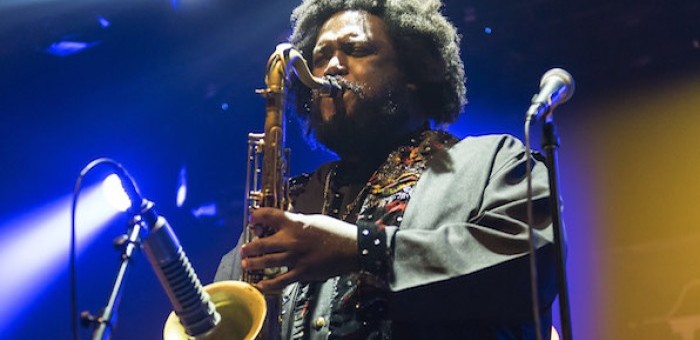Jan 13, 2026 2:09 PM
More Trump-Kennedy Center Cancellations
The fallout from the renaming of the John F. Kennedy Center for the Performing Arts to include President Donald…

Kamasi Washington performs material from his three-CD opus The Epic at Webster Hall in New York on Feb. 24.
(Photo: ©Jack Vartoogian/FrontRowPhotos)The Los Angeles-based tenor saxophonist Kamasi Washington, arguably the hottest musician in jazz as measured by the current amount of buzz and critical acclaim, made a triumphant return to New York City on Feb. 24, playing to a sold-out crowd of 1,500 at Webster Hall.
The concert, which had been scheduled to take place during Winter JazzFest in January, was delayed for a month while Washington recovered from a broken ankle sustained during his recent European tour.
Recognizable for his burly sound as much as his flowing dashikis, Washington has revived a brand of jazz that has been described as “spiritual” and “black consciousness jazz,” nodding to the style of late-period John Coltrane and other musicians influenced by Trane in the late 1960s and early ’70s, such as Pharoah Sanders.
After playing in Gerald Wilson’s big band and as a sideman for high-profile hip-hop artists, including Snoop Dogg and Kendrick Lamar, Washington’s lofty ambitions became clear last year when he released his first solo album, a nearly three-hour opus on three CDs portentously titled The Epic. Accompanying him on the album was his 10-piece band, The Next Step, as well a 30-piece orchestra and a heavenly choir.
The album was met with glowing reviews. Clearly, anytime you’re being compared to Coltrane, you’re doing something right. Washington is certainly a masterful, fluent and emotional tenor saxophonist; but he isn’t the only saxophonist out there. In the last 10 years or so there has been a bumper crop of equally great players.
Then there’s the problem with epics: They are long. Sometimes too long. Although his talent is obvious and his output prodigious, there is something to be said for concision. Many of the 17 tunes (including 14 originals) on the album are memorable, but the three-CD set suffers from bloat: There’s hardly a 10-minute tune on it that wouldn’t have been better as a five-minute tune.
Washington’s ability to establish his own origin myth is part of the mystique of Kamasi. In the media and from the stage, he has described a dream he had after writing The Epic; in the dream he is a warrior who battles a guard protecting a gate at the top of a mountain. The fight, he says, is over the right to “protect the music and push it forward,” as he told The New York Times Magazine.
Beyond the myth-making, a number of factors came together to make Washington a crossover star: There’s his cosmic black-consciousness image (the album cover depicts him in dashiki holding his horn against a background of stars and planets); the political content of some of his songs, which is perfectly in synch with the “Black Lives Matter” movement; his highly publicized association with hip-hop superstars; the audacity of his three-CD debut; his penchant for extravagant orchestration and stagecraft; and the festival-ready danceability of the band’s urgent brand of jazz. His tunes, most of which build to a shattering climax, are designed to conjure ecstasy.

Belá Fleck during an interview with Fredrika Whitfield on CNN.
Jan 13, 2026 2:09 PM
The fallout from the renaming of the John F. Kennedy Center for the Performing Arts to include President Donald…

Peplowski first came to prominence in legacy swing bands, including the final iteration of the Benny Goodman Orchestra, before beginning a solo career in the late 1980s.
Feb 3, 2026 12:10 AM
Ken Peplowski, a clarinetist and tenor saxophonist who straddled the worlds of traditional and modern jazz, died Feb. 2…

The success of Oregon’s first album, 1971’s Music Of Another Present Era, allowed Towner to establish a solo career.
Jan 19, 2026 5:02 PM
Ralph Towner, a guitarist and composer who blended multiple genres, including jazz — and throughout them all remained…

Rico’s Anti-Microbial Instrument Swab
Jan 19, 2026 2:48 PM
With this year’s NAMM Show right around the corner, we can look forward to plenty of new and innovative instruments…

Richie Beirach was particularly renowned for his approach to chromatic harmony, which he used to improvise reharmonizations of originals and standards.
Jan 27, 2026 11:19 AM
Richie Beirach, a pianist and composer who channeled a knowledge of modern classical music into his jazz practice,…